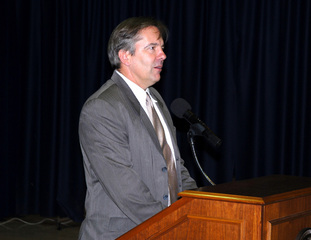NCSU Professor Describes State’s Changing Economy at VGCC

North Carolina State University professor Dr. Roland F. Stephen spoke on the economic consequences of globalization for North Carolina on Oct. 24 at the Vance-Granville Community College Civic Center. Almost 200 VGCC students, staff, faculty, trustees and members of the community, including students from Northern Vance High School, gathered to hear Dr. Stephen, and others at the college’s satellite campuses watched by a live streaming video link. His presentation was the inaugural installment in an International Speakers Series, co-sponsored by the VGCC Global Awareness Committee and the University of North Carolina’s World View program. VGCC Dean of Business and Applied Technologies Bobby Van Brunt, who chairs the Global Awareness committee, said that the purpose of the series is “to familiarize our students and our community with the global issues impacting our lives now and in the future.”
Stephen said that he was particularly interested to speak at VGCC because “the people in the community college system here in North Carolina are at ‘ground zero’ for the processes of globalization that I’m discussing.” He said that community colleges must respond quickly to a changing economy.
“North Carolina has a brilliant future,” the professor, a native of Great Britain, declared. “In 20 or 25 years, it will be a completely unrecognizable state. It will be more urban and it will depend on a technology and knowledge-based economy. However, it faces challenges in the international economy.” Stephen explained that 2.5 billion people will soon join a labor market that no longer has barriers between individual countries. “You are all part of a giant global pool,” Stephen said to the college students. “This is a huge opportunity, which plays to the strengths of the American economy, but there are also risks. If you’re not prepared, the winds that blow as a result of these changes will be disruptive to society.”
Stephen asked the audience to consider how the state is adapting to a loss of textile manufacturing jobs. The state’s new economy, he said, will focus on services, such as health care and financial services, but also on “high-value, technology-intensive” manufacturing, including possibly bio-manufacturing. The business environment is changing, with companies increasingly outsourcing many functions to specialized firms, Stephen said. Small, entrepreneurial businesses will flourish, as will businesspeople who communicate well with others. Young people must finish high school and obtain high-tech skills at community colleges and universities in order to compete, according to Stephen. “Our college participation rate must be higher,” he said. “The majority of jobs in the economy that’s being created by global change will require some higher education. You don’t have to go to a UNC campus for four years. You can get what you need right here [at VGCC]. But you’ll have to be continually learning, and you have to be in charge of your own destiny.”
Dr. Stephen is an Associate Professor in the Department of Political Science and Public Administration at North Carolina State University and is also the Assistant Director for Research and Policy at the university’s Institute for Emerging Issues.
Above: Dr. Roland Stephen of N.C. State University speaks on the effects of globalization on North Carolina in the VGCC Civic Center on Oct. 24. (VGCC photo)

